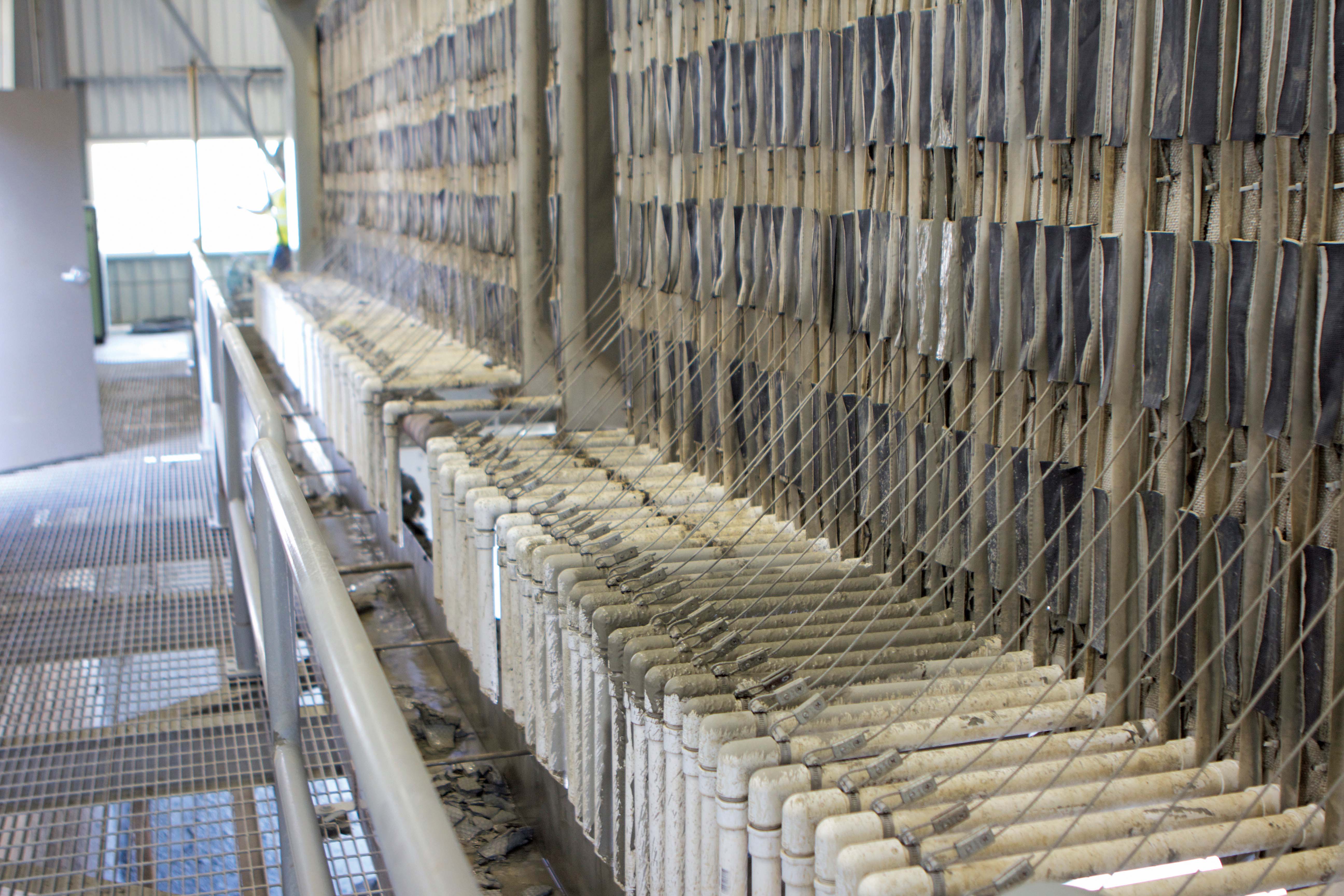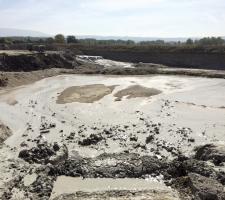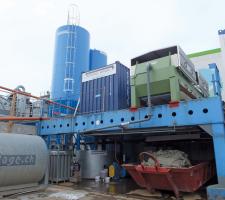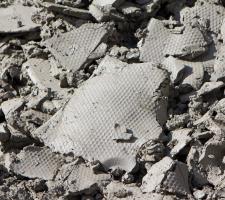
Effective water recycling saves quarry bosses money and enables them to meet increasingly tough environmental regulations. Guy Woodford reports.
Stevens Creek Quarry faced many of these same challenges. For decades, workers dreaded the monthly need to drain and clean out the quarry’s settling pond for its excess slurry tailings. Every 30-45 days, the entire operation had to shut down for up to eight days while the pond was cleaned, costing up to US$80,000 (€70,760) each cleaning. Additionally, the 30.5m x 60.9m settling pond was taking up valuable space in the quarry.
Owner Rich Voss and his son, operations manager Jason Voss, were frustrated by the lost time, high costs and mounting inconveniences associated with the settling pond. Natural raw materials never consolidated in the pond, so flocculent had to be mixed into the tailings to allow settling, making disposal possible at the reclamation site. Once the tailings accumulated in the pond, the plant had to be shut down for the pond to be cleaned out and made operational again. Additionally, the 170acre operation had limited space for creating a second settling pond that would allow work to continue uninterrupted.
To find a solution, they called on McLanahan. McLanahan took samples to analyse for potential solutions that would separate and dewater the fines from the effluent and eliminate the need for a pond.
After carrying out particle size distribution analysis to determine the amount of recoverable sand, an Ultra Fines Recovery System was recommended to reduce the volume of material to be treated by the fines effluent treatment solution. Settling tests were also run to determine the settling and compaction rates, as well as underflow densities for different thickeners.
The McLanahan team ran filtration tests on the resulting thickener densities to find the optimal way to minimise capital costs and produce cakes that could be easily handled and used for reclamation. Rich and Jason Voss selected a 7m x 13.5m Deep Cone Thickener as the higher-density underflow resulted in shorter press cycles, as well as lower total capital cost. It was also determined that a 2m x 2m 135-plate filter press would be able to completely eliminate Stevens Creek’s settling pond.
Today, where the settling pond once existed, Stevens Creek now has a highly convenient area for stockpiling aggregate. The quarry has increased its stockpile/inventory area, which will allow the operation space for future expansion.
“We’ve eliminated the downtime from having to shut down the operation to deal with the settling pond,” said Jason Voss. “Even though the filtering is done as batches, it’s going while the aggregate plant is running. That makes it so much easier, and it saves us time and money.”
The Ultra Fines Recovery System has made it cost-effective to recover nominal 300 micron to 38 micron (-50 mesh x +400 mesh) fines as a conveyable, stackable fine sand product. It recovers more than 20 tonnes/hour of the fine sand. The Deep Cone Thickener settles solids into an underflow density of 45-55% solids before feeding it to the press. The filter press dewaters material into cake that is 75-80% solids and recovers roughly 30 dry tonnes/hour of filter cake, which is used for reclamation of the quarry.
As a result of the new system, the quarry has realised savings of nearly $1 million (€884,500) a year in costs associated with not having a settling pond to drain. In addition, they no longer have 50-75 days each year where the entire operation is shut down.
“Working with McLanahan has been great,” said Rich Voss. “They don’t just come in and sell you a piece of equipment. They’re here to help us figure out what we need, how to maximise our budgets and then support as we get the system up and running. They’re part of our team.”
Fraccaroli & Balzan (F&B), a leading filter press manufacturer headquartered near Verona, Italy, is continuing to target growth from exports – particularly North and South America and Europe.
The company was this summer installing a 160-plate 2m x 2m filter press and an aggregate sector for a customer in Arkansas, while three 190-plate 2m x 2m filter presses were being supplied to a frac sand production customer in Minnesota. This installation will be F&B’s biggest working filter press to date.
In Europe, a 120-plate filter press was due to be installed for WKG in Raciszyn, southern Poland by the end of October 2015. “This is the complete plant. The wastewater treatment plant, with clarifier, filter press and all the other accessories,” explained Andrea Giglioli, F&B’s area manager for North America. “The filter press is an overhead beam, 2m x 2m four-piston machine. It will be used on an aggregate material that is very difficult to filter as it contains a lot of clay. We have supplied a lime system in order to minimise water and allow the formation of dry cakes. All the material from the region has the same characteristics.”
During a recent visit to F&B’s HQ by Aggregates Business, Marco Balzan, F&B general manager, said the company was a leader in its field in terms of technology and logistics. Pointing to a picture of F&B’s FP 2000 2m x 2m four-piston model, he said: “This is the first filter press in the world that you can transport in a standard container. It can be completely disassembled. This saves a lot of money.” The containerised transport solution was, says Balzan, initially born out of a request from F&B’s US dealer, keen to cut traditionally substantial filter press transport costs.
Of F&B’s groundbreaking technology, Balzan said the firm developed a robot for the FP 2000 that sits on top of the filter press and shakes its plates to enable dry cakes to fall quickly, without any operator involvement, improving efficiency and, crucially, safety due to doing away with the need for human intervention in this part of the production process.
“There are two big categories in filter presses: side beams and overhead beams. We were the first to introduce wide open [filter press] overhead beams,” added Giglioli. “Until this model of machine, all our competitors had overhead beams on top of the machine. This meant the structure of the machine was closed. Now we have started seeing our competitors using the same system, but without the robot.
“We are continuing to change details in this filer press’s software and mechanics in order to improve it. The model is undergoing its third revision.”
Balzan said that the third revision is seeing the FP 2000’s washing system being moved from the side of the filter press to the top, where the robot is located, automatising the washing process. “When you wash something, you should start from the top. This change also eliminates for operators a dangerous process at the side of the machine.
“With the use of the robot, our filter presses are also fast. It opens and closes five plates at a time, rather than the standard one, before starting the shaking process and moving the plates. This means you save 10-15% in production time each day.” Balzan also said that the faster production time means that customers need less plates on their filter presses to process the same volumes of material, reducing the overall cost of each F&B filter press.
In the US,
In South America, F&B has seen recent sales of its filter presses in Colombia, Peru and Ecuador. Some of the sales have been partly down to some countries’ environmental authorities toughening up regulations on how to treat quarrying and mining-generated sludge.
Another Italian filter press manufacturer,
With the need to comply with ever tighter greener quarrying regulations, particularly in Australia and Europe, in countries such as Switzerland, slurry generators can no longer discharge unwanted slurry in a lagoon, and by taking it to a quarry owner or contractor with an appropriate washing plant and filter press, they also gain peace of mind that they have correctly disposed of their unwanted material.
The widely contrasting slurry material presented to the quarry owner or contractor means that their filter press must be highly adaptable.
“When you have to drill down [into the earth] the sludge you create can have a lot of different matrix, a lot of different soil typology. To allow the drill to go down, you sometimes have to put inside some fluidisation agent, some bentonite and so on. So, when the slurry delivery truck arrives, you don’t know exactly what type of material is in the truck. Sometimes the truck discharge is grey, sometimes it’s yellow, and then it’s also sometimes dense, other times liquid. Your system needs to manage all these differences,” explains Matteo Parolini, of TI. “Maybe this is not the core work of the quarry, but many quarries are closing. They have to find some external income sources.”
Parolini says that TI asks quarry owners and contractors for samples of each of the materials they are looking to clean in order to adjust the chemical dosing unit of the TI filter press they are buying to ensure the best results. Subsequent new materials to be cleaned are also sent for sample analysis, and, if necessary, the filter press chemical dosing unit adjusted again. Each TI filter press is containerised when shipped.
Switzerland-based Serbeco are an example of a waste recycling company that is benefiting from a state-of-the-art TI filter press.
Company CEO Bertrand Girod says: “Our family company Serbeco is active in collecting, sorting and recycling of waste in the Geneva region of Switzerland. The transportation of drilling muds and operation of landfills are part of our activities.
“Anxious to reduce the landfill of liquid materials and quality materials (sand, gravel), we found in Tecnoidea a quality partner for the development of our facilities.
“They have risen to the challenge of being able to treat sludge of different quality in a single compact installation.”
Smiths Bletchington’s Gill Mill quarry just south of Witney in county Oxfordshire, England is using a
The use of the AquaCycle A400, which features a de-aeration chamber, integrated rake mechanism, centre diffusion drum, full diameter static bridge, a peripheral weir and a pre-assembled de-sludge unit, is said to reduce the area needed to accommodate ponds and lagoons, while also, crucially, reducing the amount of fresh water required to feed your washing plant by up to 90%.
John Bell,
“This area particularly can flood. As soon as you get into flood conditions you can’t add to that and need to try to retain the water you have onsite. Our competitors locally are all in the same position as ourselves, but we have the benefit of having material stockpiled above ground. And because we have the centrifuge and the water in a closed loop, we are able to process materials without adding to flooding issues.”
Bell said his company has been impressed by the performance of its CDE Global washing plant solution and the attentiveness and quality of the Northern Irish firm’s servicing and maintenance support.
The M2500 E4X plant at Gill Mill has a compact chassis which minimises its footprint onsite and has easily integrated with the AquaCycle A400 and centrifuge and AggMax 83R systems.
As well as processing construction and demolition waste material, sand and gravel, the M2500 E4X is also suited to processing other materials such as crushed rock, crusher dust, and iron ore.
The majority of Smiths Bletchington Gill Mill quarry sand and gravel customers are said by Bell to be local, but the company also supplies from the same quarry shingles to customers in other parts of the UK such as South Wales and Yorkshire.















